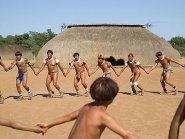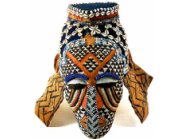


Anthropology Courses
The numbers in parentheses adjacent to the course name are the number of course units earned upon satisfactory completion of the course.
ANTH 101B Introduction to Cultural Anthropology (1). An introduction to the principles of cultural anthropology, this course analyzes the ways in which human groups construct and articulate meaning. It explores the various ways of thinking, feeling, subsisting, communicating, and believing.Major topics include language, economic production and consumption, sex and gender, and the creative arts as expressions of culture.
ANTH 190 Special Topics in Anthropology (1). These lecture/discussion courses are designed to extend the range of the curriculum and give students an opportunity to explore special topics. Their topics are contingent upon the expertise of current departmental faculty. Any prerequisites will be indicated in the course schedule. Students may take more than one ANTH 190, ANTH 290, ANTH 390, or ANTH 490 course during their career with different titles and content.
ANTH 201P Introduction to Physical Anthropology (1). How did human beings evolve? This course explores the basics of evolutionary theory, primate development and behavior, and the hominid fossil record. The lab includes exercises on inheritance, comparative osteology, and anthropometry.
ANTH 210B Tango,Telenovelas,Taco Trucks (1).This course takes an anthropological approach to the study of the pop culture of Latin America and the Caribbean to analyze relationships between socio-political and cultural expressions. We examine popular culture as a site of contention over social meanings and relations of power. Dances such as tango and reggaeton, TV shows such as telenovelas, food, beauty, sex, and sexuality are examined as sites where Latin American national, racial, gender, and class identities are constructed, commodified, contested, and globally circulated. Offered at least once every two years.
ANTH 285, 385, 485 Independent Study (0.5, 1). Students may take more than one ANTH 285, 385, or 485 course during their career with different titles and contents.
ANTH 290, 390, 490 Topical Seminar (0.5, 1). These lecture/discussion courses are designed to extend the range of the curriculum and give students an opportunity to explore special topics. Their topics are contingent upon the expertise of current departmental faculty. Any prerequisites will be indicated in the course schedule. Students may take more than one ANTH 190, ANTH 290, ANTH 390, or ANTH 490 course during their career with different titles and content.
ANTH 301 Qualitative Research Methods (1). This course provides an introduction to several qualitative research methods, which may include participant observation, network analysis, historical methods, surveys, linguistic methods, cross-cultural comparative research, and visual methods. Students will design and implement their own “mini-studies” using these techniques and gain practical experience in qualitative research methods. Offered at least once every two years. Prerequisite: ANTH 101B or SOCI 101S.
ANTH 395 Teaching Apprenticeship (0.5). Pass/Fail only. A teaching apprenticeship provides an opportunity for a student with an especially strong interest and ability in anthropology to achieve a deeper understanding of a given subject area by working directly with a department faculty member in the design and implementation of a course. The apprenticeship is arranged by mutual agreement between the faculty member and the student. Such an experience is especially beneficial for students who are considering university teaching as a profession. Prerequisite: Permission of instructor. May be repeated once within the department.
ANTH 396 Research Apprenticeship (0.5 or 1). A student serves as an apprentice to a faculty mentor on a project that directly supports that faculty member's research agenda. Permission of instructor. Pass/Fail or letter-graded; 0.5 or 1.0 units; limited to 1.0 total units to count toward the Anthropology minor.
ANTH 397 Internship in Anthropology (0.5, 1).Letter-graded or pass/fail. This course provides an opportunity for students to enrich their classroom experiences by exploring a substantive area of anthropology in an approved setting. Full-unit internships require 140 hours for the semester; half-unit internships require 70 hours for the semester. The student intern and supervising instructor negotiate the setting, structure, requirements, and outcomes and outline them in a contract signed by the student. Basic expectations include field notes; a research paper, project, or other appropriate work product; and a letter of evaluation from the site supervisor. Students may take only one ANTH 397 unit for elective anthropology credit. Only one full-unit or two half-unit, letter-graded internship(s) may count toward the minor. Prerequisite: Anthropology minor status or permission of instructor. Enrollment in an internship course requires students to attend an orientation prior to beginning work at their internship site. For more information regarding internship orientations, please contact the Office of Career Success at [email protected] or 386-822-7315.